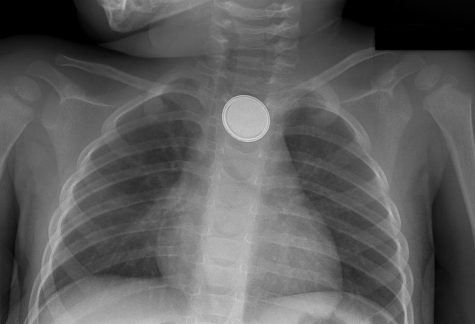Batteries cause an increase in emergency room visits

ER visits due to batteries in everyday electronics and items has doubled with over 70,000 children in the past decade going to the emergency room due to ingesting batteries. According to USA Today, this is more than twice the rate between 1990 and 2009. 
The likely cause of the dramatic increase is the growing commonality of toys that feature lights, sounds, or movement. Parents might assume that in a product marketed as a toy, their child is safe to play without supervision, but the batteries inside pose a threat if not secured in the battery compartment.
There are an estimated 7,032 button battery incidents a year, with battery related trips about every 1.25 hours. USA today has also stated that more than 84% of patients were under the age of 5, and button batteries were 85% of the problem.

Lithium button batteries are one of the most dangerous batteries because when they get in contact with bodily fluids like saliva, it can cause an electric current to form. This current can cause a chemical burn which can damage the esophagus badly. Batteries can also become lodged in airways, obstructing air flow. They can also cause organ damage. If placed in the nasal area the battery current can cause damage to the septum. Swallowing one of these batteries is a true medical emergency.
Medpage Today has stated that 90% of visits are from battery ingestion, 5.7% from nasal insertion, 2.5% from ear insertion, and 1.8% from mouth exposure. Most of these batteries come from watches, toys, and games.
According to The New York Times, 12% of children taken to the emergency department because of battery ingestion required hospitalization. The New York Times has also stated that button batteries are about the size of a quarter, which is the perfect size to get stuck in the esophagus.
Mrs. Mayer, sixth grade math teacher on the All Star team and mother of three children, says that when her kids were younger, she would make sure that the batteries were secured very well. Most modern toys have the battery compartments secured with screws. She also made a point to tell her children not to eat anything that isn’t given to them at dinner or snack time. She would firmly tell her children no when trying to eat something not edible. Mrs. Mayer says that she stores batteries up high in a closet to keep them safe and away. 
But not all parents are aware of the dangers that batteries can pose.
The New York Times stated that, if a child ingests a battery a parent or guardian needs to call poison control as soon as possible.
These batteries should be kept far out of reach like in a closet or cabinet for the safety of small children and kids. Making sure that any item that the batteries are secured shut. USA Today stated that the batteries should be properly disposed of, even if the battery is dead. Even though they are dead they still have enough charge in them to cause damage.
Keeping any battery hidden and away from children is very important for their safety and health.






